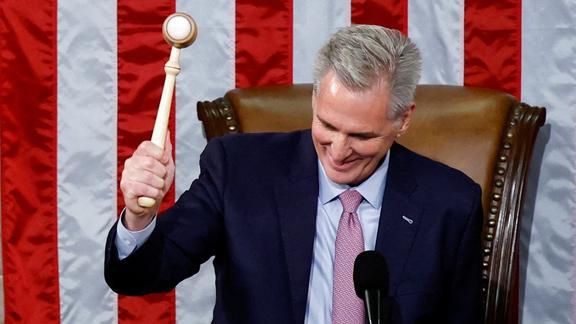
1 minute read
Speaker of the House
By Elaine Wang
On January 7th, 2023, Republican Kevin McCarthy was elected 55th Speaker of the House after 15 long rounds of voting. Despite his party holding the House majority, McCarthy struggled to negotiate with about 20 representatives who stopped the House from normal operation In the 12th round, McCarthy pulled off a dramatic turnaround, gaining 14 GOP votes from far-right conservatives. His 2023 run was one of the longest speaker elections in history and marked the first time in 100 years a speaker had not been elected on the first ballot He later offered many concessions, and entered office with the self-proclaimed goal to “stop wasteful Washington spending, to lower the price of groceries, gas, cars, housing, and stop the rising national debt."
Advertisement
In November 2022, Nancy Pelosi announced her planned resignation as leader of the House Democrats, a position she had kept through four presidencies She passed the torch on in January to Hakeem Jeffries, a representative from New York who was elected unopposed as House Democratic leader Pelosi currently remains a member of Congress. The vacancy of the position of speaker left the House unable to conduct business for 5 days, as the House cannot induct new members, hold committee meetings, nor participate in security briefings without a leader
Kevin McCarthy, representing California’s 20th District, was first elected to Congress in 2006 McCarthy became majority leader in 2014 and minority leader in 2019, when Republicans lost the majority in the 2018 midterms. He had previously run for speaker in 2015 but dropped word out of the race to succeed John Boehner. By making concessions this year, he secured the position of the speaker but also greatly reduced the position’s power. One of the main changes he made was to the process of ousting speakers In 2019, Pelosi introduced the requirement for a majority vote of the controlling party to bring a motion to vacate the speakership, but McCarthy restored the ability of any one member of Congress to initiate the procedure. The Freedom Caucus, the farthest-right bloc of the House Representatives, also gained McCarthy’s promise for more single-subject bills and his refusal to increase the debt ceiling in the next federal budget agreement. Furthermore, McCarthy granted Freedom Caucus members more spots on the House Rules Committee and House Appropriations Committee, two of the most powerful committees in the House These changes have drawn both criticism and praise to the newly inaugurated speaker, who claimed he would “be the check and provide some balance" to the Biden administration. In the future, McCarthy plans to repeal funding for over 80,000 IRS agents, expand aid to local police forces, and tighten border controls to address immigration.






